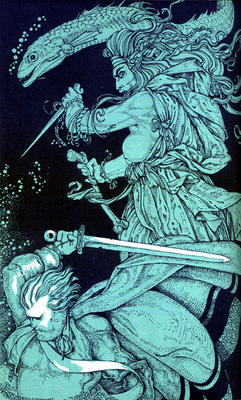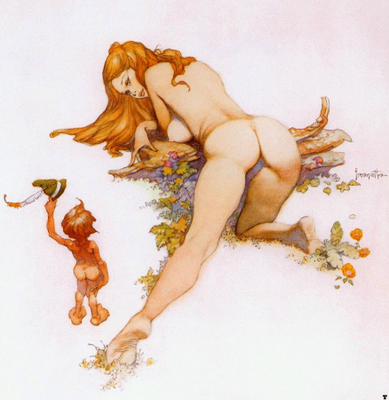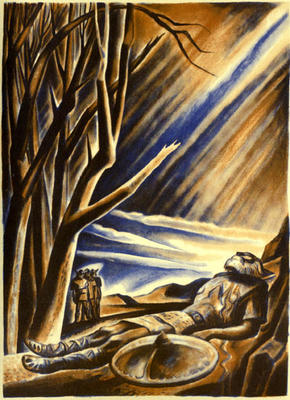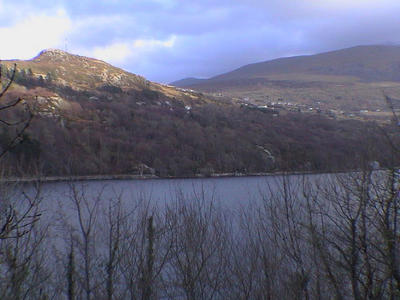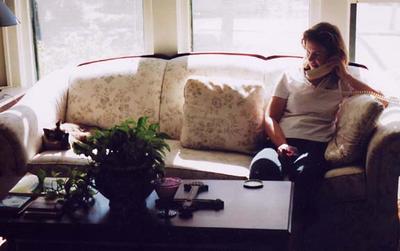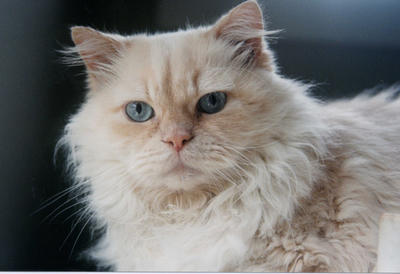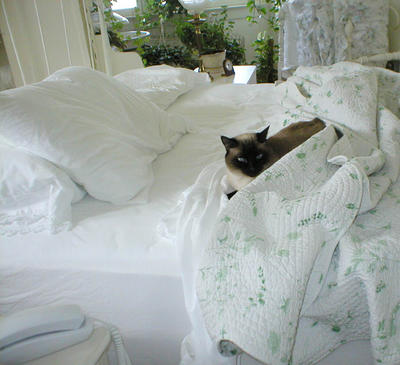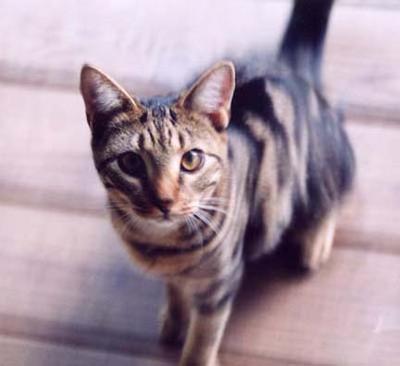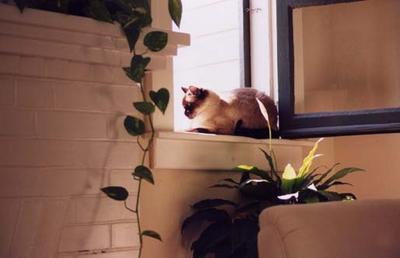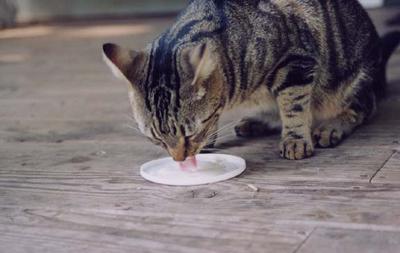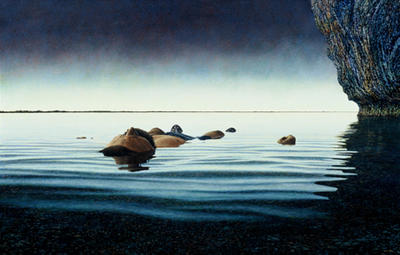
Shall I tell you a story? Do you prefer history, a love story, a good mystery, something deep, something fleet for drowsy afternoons on a summer vacation's beach? Poetry or prose? Essay or something more scholarly? Shall I woo you with metaphors or wow you with muscular sententces? Shall I shine bright or offer cool shade from such heat, a blue dreamy glade of downy billows?
Why bother at all? What drives me to say, to sing? What is it that wants to be told, and am I anything more than its pen, mouth, keyboard? Shall I create a world? Let you feel the curve of my wife's hip as I stroke it at first light, sense its immaculate semblance to the curve of our Siamese sleeping on a nearby chair? Shall I curvelike motion into a deeper, yeastier sea? Do you care to see what lies far down, drowned, animating my anima? Shall I blend it all together into one song, one post? Today, perhaps , but who knows how the skull wil chatter tomorrow ...
***
Joseph Campbell was driven to tell a story he was convinced lay at an obscure center of things -- a story which he felt was desperately needed in the off-center, fragmenting culture of the middle twentieth century. "My hope," he wrote in his preface to
The Hero With A Thousand Faces, "is that a comparative elucidation may contribute to the perhaps not-quite-desperate cause of those forces that are working in the present world for unification, not in the name of some ecclesiastical or political empire, but in the name of human mutual understanding."
His heroic monomyth -- tilled from worldwide sources, some as ancient as our dust, others as far-flung as our most mysterious dreams -- is a story familiar to all human cultures, and thus moot for resuscitating our fraying one, like a dead giant or enthralled Merlin or lost Arthur to come to the aid of our contemporary wasting sickness.
21st CENTURYEvery age requires a new confession.- Emerson
Half of me walking
from a dead century.
Launched in '57
with Sputnik on
the crest of the
Baby Boom.
My tit the Sixties,
Watergate my weaning.
I walked off an
ex-Christian geek
who just wanted to
play the solo to
Led Zepplin's "Since
I Been Lovin' You."
Tolkein and Tull
my dormitory spooks
down a far Western night.
Nuclear winter and
Sylvia Plath's gas oven-
Booze, Brian Eno,
Roethke's
Straw for the Firefed to the flames
of one very bad
winter night.
A guitar bridge through
a woman's white thighs
leading to me southern
beaches, the end of
the cold war and
desconstruction. Sex
signifying nothing in
an endless moonwalk
neon-lit by Mikey Jackson's
vanishing nose. Corporate
gigantism in a dinky stockroom
as the last band failed
and I sobered up to
be dad student and
intellectual. Recession
and Iraqi taunts
my distaff, dark mentor,
tormented by a bloodless
air war with its flashy
blade and oh so dark shadow.
I divorced to global
capitalism and the Internet,
a madeira darkening the
sea, harrowing, fattening,
going online and virtual.
Teens take up weapons
and spray illiterate brains.
I remarried inside a secret
bottle and sprayed
the cage with tiger's pheromes.
Didn't work. Terrorist
bombings ashore and abroad
toll the awful clock,
turning one century's wild
page to the next. No
bug worth the millenium's
steel byte. Kept writing
through hell's circles to
plug the jug again and
jog on. What time is there left
to speak of what follows?
A page, maybe two, sending
off as many boats as I can.
I suckled on war and modernity;
the other half of me now
raises sons and daughters
in a wild fosterage,
weedy in its words
and headed deep for the hot heart.
The slaking of our thirst in that story --as evidenced by the popularity of Campbell's writing -- reveals the deep and lasting satisfaction of myth, where so many of its its recent tributaries have gone dry.
Surely the bones of that story -- calcinate reveries of a bliss -- are what Campbell drove him to begin. The ten thousand stories he would later collect from folklore collections, sacred texts, and the walls of dark caves all helped to add muscle and organs to that mythic creature.
What Campbell brought forth out of himself saved him from the shadow of its absence among us. His task was identified with the heroic monomyth (a phrase he lifted from Joyce and glossed from his readings in psychoanalysis): "The full round, the norm of the mon-myth requires that the hero shall nowbegin the labor of bringing the runes of wisdom, the Golden Fleece, or his sleeping princess, back into the kingdom of humanity, where the boon may rebound to the renewing of the community, the nation, the planet, or the ten thousand worlds." (
Hero)
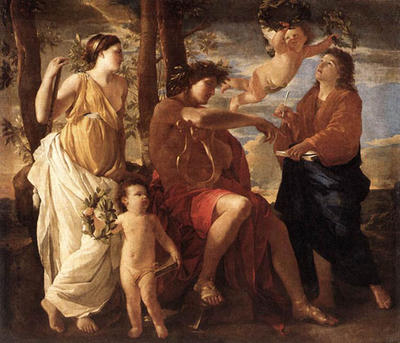
What a strange yet familiar recognition I sure felt reading
Hero and the three-volume
Masks of God! And what an appetite I developed for learning the stories! For five years or so I did nothing but that. Homer, Ovid, Virgil, Beowulf, the Arthurian cycle, the Celtic cauldron of plenty (from Yeats, Graves, Anne Ross & then Fiona MacLeod and Alwyn & Brinsley Rees), American Indian myth, accounts from archeology, anthropology, depth psychology and literary criticism, and then the artists -- Dante, Shakespeare, Melville, Joyce, Rilke. The story drew me into depth and breadth, and I couldn't get enough of it. Robert Bly tells of Campbell, just out of college, going into the woods for five years and reading, reading, reading, "becoming Josesph Campbell;" I read Campbell, and then read outwards from him, becoming a singer of sorts.
As I've said here before, the old Irish poets were not allowed to write a lick of their own verse until they had learned the entire cultural canon -- the immense corpus of stories, satires, paeans and laments that Irish poets had been passing down, orally, for hundreds of years. You don't tell your story until you know THE stories; there is a correct riff to it, a knowledge which can't be attained except by pouring all of that culture into one's noodle. A good story must have bones; it must be familar and not, and the telling must satisfy a communal need which is familar and not; it resonates with both history and mystery.
Rees and Rees put the storyteller's task this way in
Celtic Heritage:
"In Welsh, the very word for meaning (
ystr) comes from the Latin
historia, which has given the English language both 'story' and 'history.' 'History' has now been emptied of most of the original extra-historical content of
historia, which derives from a root meaning 'knowing,' 'learned,' 'wise man,' judge.' The old Welsh word for 'story,
cyfarwyddyd, means 'guidance,' 'direction,' 'instruction,' 'knowledge,' 'skill,' 'prescription.' Its stem,
arwydd, means 'sign,' 'symbol,' 'manifestation,' 'omen,' 'miracle,' and derives from a root meaning 'to see.' The storyteller (
cyfarwydd) was originally a seer and a teacher who guided the souls of his hearers through the world of 'mystery.'"
THE SINGERSBack in '91 I tried
to form a creative
group of men called
The Singers -- a
marriage of men's
movement drum-
banging to the mythic
background of fireside
tales. It seemed the
right next thing to
do though the result
seemed all wrong.
I culled a few guys
from the Orlando
chapter of men's
groups (on fire back
then, when Bush
Senior was still
whackin' away at
Saddam in Desert
Storm and the economy
was beginning to
rouse toward its roar).
and we met in
the boardroom of
the Orlando Shakespeare
Festival every couple
of Wednesday nights.
Each guy was to
bring to the meeting
a Contribution -- a
story, poem, myth,
song, drawing, something
which voiced a tenor
of our chosen Theme:
Orpheus, Trickster,
Fathers, Mothers,
War Gods, Apollo,
Dionysos, Totems,
Hermes, Inner Guides,
Eros. Fresh-pickled
from three years
of heavy reading
on the borders &
ley lines of those
themes, I dug down
into each with all
the frenzy of a man
with two weeks
to live, penning 30
to 50 pages of notes
on what I found
further down &
shaped it somehow
to take along.
How well I recall
the fraught urgency
of the effort as
I crammed those
studies in long
before first light
there in my dank
study of the Hyer
street house of
my first marriage,
my then wife- and
stepdaughter sleeping
off the previous
night's tangles and
torments, me at that
cramped desk with
a wall of books
to my left and
dark opened windows
to my right, night
buzzing outside
like dim sweet marina,
a small table as an
altar just below one
window, arrayed with
stone votives, a Celtic
cross carved of wood
from Iona (rare, lost when
I took it along to
a company awards
dinner staged at a hotel),
shells, a skull coffee
cup with three I Ching
pennies in the cowl).
Digging furiously
in the dirt between
the lines of Walter
Otto on Dionysos or
Karl Kerenyi on Apollo
or Hillman or Campbell
or Jung or Eliade on
the next god dripping
and gleaming with
the Unknown. -- God
how I filled up those
narrow spiral notebooks
trying to build a
cathedral in two weeks --
And how full, almost
to bursting I was as
I walked downtown
those Wednesday nights,
notebook in hand, with
six poems (three of
my own), two stories
and ten pages of
outline to Sing when
my turn came -- fool.
The gatherings were
always dismal, two
guys not showing up,
a third empty handed
(too busy with work &
wanting instead to
talk about his latest
fall from love); maybe
a fourth and a fifth
would have something,
the start of a poem,
a story somewhat
oblique to the Theme.
For those dozen or
so gatherings -- meant
to be a creative ring
of fire -- I was caught
between a raging fullness
within and a tinderless
green hour without --
no match for the worlds,
certainly few words
for those Singers. After
three or four meetings
the numbers began
to shrink, to five,
then three. The next
time me and the other
guy just talked about
our jobs, since he had
nothing else in hand.
Then one night I
sat in that Bard-decked
room all alone, reading
out loud some riffs on
Hermes that had
kept me almost wild
for two weeks. By then
there wasn't even a
towel to throw in -- no
one else cared even
to fray. Perhaps it
was simply fishing
in the wrong waters --
those men's groups
rode a short wave
then mostly expired --
I might have culled
some scholars from
Rollins College or
UCF with an itch
to dally away from
their riven fields of
-- though today
I think that unlikely
because such studies
are career and die
slowly in that (the
director of the Shakespeare
festival, a prof at UCF,
told me at lunch one
day he hadn't cracked
a book in years). No:
the travail was mostly
mine, or it belonged
to that surgency within
that wanted to see
further in the dark
of time and soul. Singers
just gave me a chance
to go far and deep
and write that passage
legitimately & legibly
down, mortaring the
motions which I still
use today.
In my first of day
routines I read back
over those journals,
culling bits of story
and insight to throw
into my Well, salt those
waters, if you will,
stir the bell to ringing,
get the skull to singing
-- see? A hundred
journals are piled
beneath my tongue,
learnings I will never
quite recall, dissolved
in whale-gut with the
rest of a life (a divorce,
re-marriage, a degree
but no more, five cats,
another job and then
another, a Well, a
poem or two thousand
with three thousand
more in tow), all
those voices stuffed
up the barrel of this
singing pen, a choral
plainsong filling a
paper cathedral which
roots me to a dream.
***
Stories are timeless, but singers evolve. We update tales to fit changing times. As I wrote here last week, Orpheus morphs: from a second-millennium BC shaman whose song carries him to the otherworld and back; to the Orpheus who accompanies Jason in his quest of the Golden Fleece; to Ovid's doomed lover whose song cannot quite return his dead wife to the living; to Orpheo of the Middle Ages whose courtly manners and training as a troubadour allows him to woo his way into the otherworld castle. "Every age requires a new confession," wrote Emerson, and we're constantly retrofitting old tales into new vehicles. Evidence "Star Wars" as George Lucas's attempt at retelling the Hero monomyth. Yet doesn't it seem that revision never quite manages to heft the original? Our worst evidence of this is in the constant Hollywood makeovers of bad television shows which stole their thunder from movies which lifted conceits from novels which stole from local barroom talk and folktales. The further we get from the source, the less potent the draught; that's why Campbell's work as a collector of stories is so important -- so we don't forget that the song of Orpheus really can bridge realms.
We also move on to other stories, genres, rhetorics, poetics. To me the hero monomyth is a good metaphor for the emergence of consciousness and the forwarding of human civilization; yet it is a rather stuck story, unable to change, fierce in its attachment to sticking to the narrative, enacting all of the scenes. It has the riven nature of a masturbation fantasy, the old parade of cheerleaders and floozies endlessly strolled and rolled in the same old hay. To me it's because the hero fights to be free of the mother (unconsciousness, the Great Mother / matriarchal consciousness which held sway over our great middle period, or simply one's personal mother) only to return to the mother, to come back to the welcoming bosom of culture, there to marry, sire the next generation of heroes, and dote in the secure amniotics of home.
SEXUAL HISTORYWe lay in bed all day
fucking and drowsing
and watching movies
on Comedy Central,
the shades drawn tight
against a cloudless hot day
thick with the smoke
of local brushfires.
Telling stories about ourselves
the way new lovers do,
accounting somehow
for the sexual history
that brought us to
this surrender, against
the grain of the
way we thought
we'd go. I stroked
your back and ass softly
as you told me about
the redheaded drop
dead gorgeous girl
who found sex in
a complete clueless
stranger - no one
would tell you about
that meaty thing
that hung from your
father's hips as he
showered with you,
or what it was you
felt riding a horse
at 14. The orgasm
you discovered with
your fingers beneath
the sheets one morning
frightened you terribly.
Your first lover
raped you because
you had no idea what it
was your were asking
for in your scant
bikini working a
surf shop in
Huntington Beach.
Desire was for you
a nameless sum
subtracted by the
world from God, yet
its pure beams always
brought you back
to an eternity.
Then we shifted
and you rested your
head on my chest
idly playing with
my cock while I
told you about my
eternal fascination
with a female's body
and the terrible
overlay of shame which
drove sex into
the vivid shadows.
I recalled the nightmare
I had a six of civil
war at my school,
parental rage embroiled
against my desire.
The kid who told
my teacher of the
games I played with
girls was on fire,
edging round the building
I hugged in terror. I
could not avoid him
and the dream ended
in my smouldering bones.
You laughed when
I told you about
conducting the Dean
girls as they jumped
naked on their beds.
These fires have so
little to do with love
- kindred, ignitory,
initiate liquors for sure,
but even after all that
fucking that afternoon
I grieved my wife
alone in our house
and later sought to
ground myself apart
from you by roaming
downtown bars
drinking Myers and
pineapple and looking
at the faces of women
gathered at the bars.
Sex is most what
it fancies, and love
is greatest when it's lost.
I'm a total fool
adrift outside those
margins, and will forever
hurt those who share
my desire even a little
while. It's a smoky,
drawn-curtains way
I wend through
the current hour.
My truths burn me
from both ends
and what's left
is this charred pile.
 HISTORY
HISTORYNo one cares much about history
in the thresh and whirl of this day
which unscrolls through waking's
droll rituals (coffee, poems by
Galway Kinnell, time here)
into the labors of life around love
(a transfusion for the sick cat,
joining a hammer of traffic
aimed at the heart of this city,
hours of making in a corporate trench):
The present is pinched and earnest,
a salty isthmus between desire
and regret: I consume it rapacious
as a wolf in a terrified fold of sheep,
my red canines clamping down on
the next whinnying sweet.
Yet in some hour late in the day
when shadows creep slowly east
she comes to visit me at my desk,
the muse of that backwards glance
which turns a wife into memory
then crumbles that shade into dust.
The muse of history threads beads
on a silver wire, joining them in
the loop of my life. Her news
is always mixed: While every bad
love has me in common, yesterday's
crisis is just a bump I traversed
during happy hour. Sometimes
I wish my tapestry belonged to
somebody's other, more tragic tale,
but that's history.
At some late hour of the day I pull
my history from the shelf and
like a mirror I enquire, shall I go on?
Am I doomed to repeat this tale every day
til there are no more days to lose,
no more loves to foul? But there
is no choice: The fever will return
tomorrow, beyond the next thunderstorm,
and silver swords will beat like wings
of plowshares curving back up
across the fertile sky and
fall toward that sweet bed
just beyond the horizon,
an arc resplendent with every
color inside this heart's dolor,
a rainbow leading to a day
gilded and sweet, the history
I always prayed for, the one
I protect and border and greet
like the woman I'll never
savor or die with or even meet.
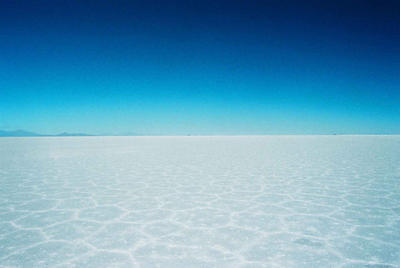
There are other stories, IMO, stories which are tandems to a plurality of gods. There are Saturnal depths and Venusian dapplements, sacred islands and itchy-hot bridles: calls to many adventures. For years I clung to a story as my own, growing as I wove the story into my history, writing a case history of boyhood failures and young man's foolery. But then there was a midpoint when things seemed to reverse; I less needed a hero than I needed a more nuanced voice, something more apt for weaving varied realms I was experiencing. Maybe I was moving back toward the older Orpheus, but I became more sympathetic with notions like polyphony, perplex, polysemous, porous, plural. With qualities that were mixed, mercurial, quicksilvered.
SONG CYCLEThere was once
a poetry sustained
between two wills,
the one in love
with the given life,
the other in lust
for another.
A music rose from
those stretching plates,
taut, viral,
pure as all waylaid,
imagined things can be.
But then came
the break with
its grim hooves.
An unharbored music
poured forth
from the wound,
bitter and droll.
A drone.
Next the nocturnes,
a descant metal
falling blue to black,
a drowned woman
bumping against
a reef of pews.
What sings now?
Open the doors and
let it go. Outside the
blossoms are pealing
bells of sweet fire.
The next poetry
is uncertain
of anything else
but plays on,
harping toward
the light of what will be.
***
Maybe that's why I turned to poetry, which is story freed from narrative, the boneless shadow of the giant free to round the vowels. It cuts through the personal and local into the grander epiphanies, where narrative seems to boat on their surface. Why not the depths inferred from surficial glimmers?
But it is most satisfying to practics an even freer artistry, to dance the genres and poetics in the plurality of story. Thus I have a love story and a voyage tale; a case history and a drunkalogue; a bildungsroman, a baedeker, and a triple-decker confessional; a scheherezhade of dreams and a cookbook of daily disasters; a slave narrative and a song-cycle of eternally waylaid beachside consummations; a gospel of tropes and a black psalter of desires; a breviary of guitars and a bestiary of bottoms. There are Penthouse letters and letters to young poets and letters home from camp and the trenches and the workplace and the eternal infernal internal, and all are love letters to the world. Why not adopt the style fit for the tale?
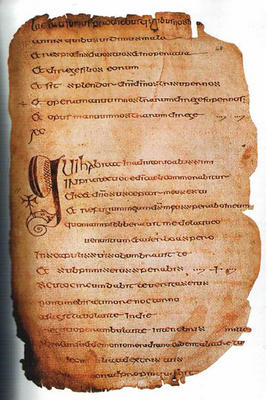
I do believe that the story changes us as we tell it, and each repeating of the story is like a chapter of that education. When I was sobering up I read a story about an Eskimo chieftain who was explaining to an anthropologist about how he brings himself to do good. "You see there are two dogs in me, a good one and a bad one, and they are always fighting, fighting, fighting in me, trying to tell me what to do." "Which dog wins?" the anthropologist asked. The chieftain thought a moment and then answered, "the one I feed the most." The tale I repeat is the one I feed the most, and the satisfaction I take in the tellings is the degree to which the story is feeding me back, nourishing me from its darkest sources.
HISTORY LESSONThe wave which
carried me here
arrived from 15
centuries back
from a shore
which harrowed
a mash of two
faiths. Columba
was the ferryman
of that betweening
age, Oran its dark
and bright page,
each bone a florid
letter, his skull
a door to
the great angels,
whose wings all
ages in their
rhymings rise
and carry one here
to smash on this shore,
this oaken door
opening back or
down or in toward
a time when the
times met in a
clash of bright wings,
when futurity's
soar took wind
on the old roar.
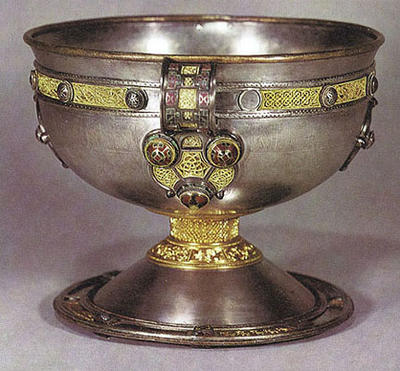 THREE CUPS
THREE CUPSfrom
A Breviary of GuitarsEvery fever of song
was complete in me
at age 14: body
heart and mind
tuned to that
singing saw inside
each wave
of the world
that crashed
over me.
A hi-wattage
channel,
without static,
without peer.
I knew the songs
before I heard them.
Picking up
a guitar,
I returned them
to the world
believing
it would listen.
The story
was complete
by the time
I was 14,
but I had much
farther to go.
Song needs
no story-it's
timeless-but
we do, and
I have much
to say about
how I variously
approached the
music as I
grew into it.
The Irish say
there are but
three songs:
laughter, love
and sleep.
There are three
cups on my
father's bardic
crest, drinking
horns dipped
into those
tuneful vats.
Effervescence,
swoon, and sorrow
have their own pitch
and key, major,
major seventh
and minor modes
of revealing
the world's
polyphonic noise.
At 14 I could
recognize each
of these tunes
as a road
on the fretboard
leading out
to the body
mind and heart
of a woman.
I would learn
they also
wound inwards
to Psyche's
tortured geography,
mapping out
anima and enemy,
muse and mood,
skirt and womb
of all my making.
What I learned of
how song brought
girls and how women
woke my inner ear
is the distance
between hearing
and knowing,
and my life
is that raw
polyphony.
This breviary
of guitars
is about
what I found
in each of those
cups, what I
missed, and
what could not
sate when
I thought
each cup
had run dry.
THE THREE CUPSWhen I read back
through my massed
stone colloquies,
I can see three
motions which
stay pure:
A voyaging mind,
my body's gallop,
this ache for you.
Inexhaustible
those three wells
from which I daily
draw, hungry for
more & aching for
what must rise--
writing the poems
working the bones,
stroking your feet.
What sustains
me in each encounter
I cannot say, but
the bread I find
there is always
enough for today
but never more.
This tells me
that all are of
the same humger
and thus ordained
(or wardened)
by God.
It is also clear
that I always
fail by wanting
more: For grander
fish hauled
from the deep, for
muscles bigger
than my frame,
for right here & now
all day and night.
Blessing and bane,
cool water with
astounding bite,
my altars have
all exceeded
their temples,
grown long
like vines and
red of tooth. How
I've howled in
the old woods
of the vacant word.
Worked this
poor body past stiff
and sore. And
oh my greed for
you, enough said!
God has given me
these preter-thirsts
but its mine to
give them back
to God's world:
No shore final,
this body old,
letting you go.
Three cups today
I fill and drain:
Balls for thought,
heart in the heat.
feet for naught!
NO HISTORYI can barely sketch
the copse of families
from which I grow
and bear these fruit:
thin traceries
from my mother and
my father, which I
scarce heard in passing.
Perhaps it's because I
never meant to have
children; perhaps
it's just the American
way, where family
is a dandelion burst
of white sails in
every direction,
piloted by any random
wind. I can
name my grandparents
and point to their towns
-small house in Cedar
Rapids and Jacksonville.
Therapy has urged me
to exhume my kindred
bones and examine them
with cold eyes; I've seen
shadows of anger and
contempt longer than
my own, and broken
hearts tolling the
years like crimes. Looking
back I see perpetual
family motion,
a throw in reverse
from South to North
and West to East, figures
boarding ships and watching new
worlds shrink along with hope;
a drainage down the tub
toward some ancient arrears,
a story told in thick Scot-Irish
brogue spilling back
into suddenly righted drinking
horns which never could
claim plenty. Still none of this
strikes pay dirt where
this poem yearns: My totems
are real, but I can't name
or know them well enough.
That might explain why there's
never enough money in the bank
or why my need for absence
wants me dead, but not
why the song need fail
upon my lips; nor why
my wife and I live so
many miles apart
from each other that
we now seem partnered
to each other's "No."
My fruits are bittersweet
and pale, glistening
with dew but too far out
to pluck. Saddest of all is
that this way is so common
to us all that tearing down
the orchard after first harvest
seems a virtue. Perhaps
this is just the karma of
the ever-westward nomad
spawned on Indo-European
steppes, a man who not long
ago reached his booming
Pacific and found no more
passage, just a thin,
eternal shore. The only
destiny now ours
repeats its few scarred hours.
 GUY'S WALL
GUY'S WALL... Less than a billow of the sea
That at the last do no more roam,
Less than a wave, less than a wave,
This thing that hath no home,
This thing that hath no grave ...
- Fiona MacCleod, "In the Night"
Tonight I sit beneath
a naked mulberry tree
on the stone bench where
Guy's ashes were interred
a quarter century ago.
Long chimes in that
tree knock their sad sweet
bones, while the moon
swings brilliant over all,
though coldly, prowing
across a raw spring night.
Sitting here is a vantage
on the productions
of myth and mystery,
not so much cynical
as peripheral, bluesy,
bittersweet. Age becalms
the spirit's buoyant fire
as surely as death
inks a darker fluid
in the pen, a weight
which does not rise
so readily. I do not mean
to criticize the night:
rather, this seat befits
a threshold half in
wonder while the
other half's cold
with rawer truths.
The bell tower and
standing stones are
all so beautiful, sheeted
as they are in such
blue-white silk-
lovely, yes, even
evanescent, engaged
in one of the oldest,
most fertile dances
the mind can imagine,
can hope, can dream ...
So why then carve a
poem from cold hollows,
brooding over the ashes
of a long-lost, scantily
remembered person I but
briefly called a friend?
Who will know this
bench serves also
as a crypt in
another 25 years?
Who will care? The stones
I sit on which cask
that dark oil
tell me nothing
of the man who once
sat up in the limbs
of this mulberry tree
as the rest of us progressed
below heading for the field,
sending down over us the deep
bass of our childhood God,
reminding-no, telling-us
to be good. The stones cannot
(or won't) explain to me
why Guy died of cancer
before age 30, scant months
after his wife Judy gave birth
to Jennifer. Stones are honest
but most times mute:
And so I must scan
the edges of the far field
where the wood gets darker
and memories are faulty
but a certain truth
can only be found there ...
I knew Guy but a season
two years before he left us all.
He taught me a little about
tuning a piano. One day we
were up in someone's hot
attic sweating under the hood
of an old upright. You have
to feel the pitch, Guy
told me. If you think about
whether the string you've
plucked is sharp or flat,
you'll never get it tuned.
And then he showed
me how, weaving his tuning
hammer up and down
the loom of strings
like a sonorous Thor.
He couldn't really explain
it-never enough for me
to learn-but he always got
it right. And when he
finished he played Billy Joel's
"The Piano Man," grandly,
rolling up and down the keys
with authority, harmonizing
the bent quiver of the piano
to the arrows of that song.
Guy had a frantic pulse
for life, for making everything
count. Some ambivalent
genius drove him to seek
the spirit's moony suburbs
halfway between nirvana
and New Jersey. One night
we walked in the woods
over there smoking pot
and talking New Age
phantasmagoria.
He showed me a railway
tunnel which had
long collapsed. We
crept into that dark
until we came upon
a rubble pile. Anybody
home? He boomed to
the devas on the other side.
Surely we'd manifest
a potato god or the
queen of cherry bloom.
Instead there was a crash
of glass and a terrible,
ball-curdling shriek;
we hauled ass out of there
terrified and giggling,
the air behind us shredded
by the nails of whatever
was and was not back in there.
It really happened, though
I doubt tonight it could have.
Only Guy can concur with me,
and he is in the stone.
Guy argued long that summer
about whether the formal
event we were planning
should be called a party or a festival.
The distinction would decide
how much much booze
would be allowed, and when:
perhaps it was a silly point,
but Guy took it to the lists
as fiercely as he whirled
that tuning hammer. Maybe
he just wanted to win the
argument, but he seemed
struck by a certainty none of
us quite fathomed. I surely
didn't know, just turned 21,
half of my father's making,
half of a something far from home
which strummed its blue guitar.
Guy lost that argument,
at least in the first sense
of things; that hot midsummer
day was the first of many
festivals celebrated here
round and down the years.
We set a wood tripod in
the middle of the field and
laced it round with bright ribbons.
I played guitar and my buddy
Dave mandolin as revelers jigged
their best in clouds of gnats
beneath a feral, summer sun.
What else transpired? Why
does that day dim so fast
and what followed stay in
focus in this sere, cold light?
At dusk we drank May
wine with wild strawberries
up in the house, listening
to Pachelbel's Canon in D.
It was all we thought a festival
should be and none of what
we knew, a culmination of
adjacent, airy enough dreams,
formalized into a dance
beneath the hottest,
brightest light of all. Over
the years the tripod was
replaced by standing stones,
and the festivals got bigger
and somehow sweeter:
equinoxes and solstices,
from Samhain to May Day
and back, attended by hundreds,
each devotee of a different
spectra of our faith:
neo-pagan, neo-Christian,
wiccan, vegan, Buddhist,
tattooist, biker, blancher,
blickerer, blueist, each
blaring their reformed
taboos, bedecked
in robes and wreaths and
and cha-cha-cha tutus.
This place has become
a capital of bucolic
whims whirling round
the eminently silent stone:
But you and I, Guy, we
were there for the first one,
peripheral to what my father made
but central to its darker twin.
For as good as all festivals go,
you had wanted more-
something closer to the
world's more fecund crotch-
and madly, so did I. The day had
been too church-like, too blanched
in that too-bright summer sun.
Two glasses of May wine
couldn't do the job:
Some other, redder impulse
was needed for our fire,
an ire which only could be found
long after the white one
went down. And so a
dissident faction of that festival
drove over to Guy's house
to do the party part,
blasting Bruce Springsteen
on the stereo, pounding
shots of Rebel Yell with
our tall-necked Buds. As we
hooted and hammered
and blasted that party jive,
Guy's brown eyes were like
ebonies of that other music
beyond the ribboned field,
burning, perhaps, with
the soul's pagan fire.
Or maybe it was cancer.
Whatever Guy might say
of that night, or how
I might remember it,
tonight I believe I'd seen
my patient, my dark mentor.
For I wanted more.
And so later that night Guy
passed me to a crazed cousin
who lived in a house
on the Delaware. I don't
remember much of what followed
except she was dark in some
folded-in, sad way, and
that her welcome had
to it a sort of ritual clench,
the birth-grapple of
the dark-hottest booze.
The next day as I made
my retreat - shrill trumpets
of a hangover blaring
in my brain pan -
I looked out a window
on the porch to see
black water flowing
almost under the house.
River house, river
witch, bestowing on
me a dark river's blessing,
carrying me away
at the end of that summer
25 years ago. I was
not ready for the New Age,
not with the big night
music playing so loudly
in my ears. The party kept me
from the festivals for many
years; tonight, again, I
try to return, and end up
here in the borderlands.
I thank you, Guy,
wherever you are among
this night's windy shades,
for teaching me about what's
been tempered between the
two faces of the dance.
We yearn and burn,
our sight is split; the view
can kill us or bless us,
be coffin to our ecstasies
or currah us to shore. I'm
not sure you had a choice,
Guy, but I thank you for
making one possible for me,
your shade my trusty door ...
Yes my friend, tonight things
are good. Before me the pond
stares back at the moon with
its black mirror and the standing
stones choir pale homages
in the field. Up in the house my
father and the others are drinking
a Scotch before heading to the field
to celebrate Wesak, the Buddhist
festival of the high Taurus moon.
Tonight, only a few folks are here
- smaller even than the baker's
dozen of New Age hopefuls
who tried with us to manifest
the sea from a glass of May wine
back in '78-but enough.
For wherever two or more
gather to plead human alms
from immensity, a least
a spark of it wilds through
into the mortal bone.
Soon, Guy, I must go and
join my ragged voice to
that prayer, but before
then I want to tell you a few
things, since it will be awhile
before I sit with you again.
I've heard your daughter is
now out of college and Judy
is happy in her way down
in Miami-No Jersey charms
for her! Second, my wife
and I emerge from our dark
hours slowly, perhaps toward
a happy enough future; my party
now at end, perhaps that
festival can begin. Her cat
Buster died last year but
appeared in a dream, saying,
I'm OK now, just wanted
to let you know I had
a good life but I won't be
coming back again.
-Did you ever let your wife know?
-And finally, my father grouses
at 75 years old that he can't stop
coming back, long after the day
five years ago he was so certain
he would die. In your time
I'm sure that time comes
soon, too very soon.
That's about all. We don't
hardly know how
to tell our stories, Guy,
much less brave an end.
I'm not sure how this poem
will get there. As I listen
to those chimes beating against
each other first calm then wild,
I know they're all I really
have of you. I wish I
could see half of what I
dream is here, but I'm
grateful you and I
remain where we are, citizens
on either side of a stone wall.
As a cold wind blows indifferently
over us, I think of all the others
whose ashes are also buried here -
AIDS victims, earth mamas,
prodigal boys who couldn't quite
get home, my dad's dog Lancelot
beneath a small dolmen next
to the house. There are crypts
beneath the chapel floor
waiting for my father and Fred,
for Albertine who's just entered hospice,
for the hopefully mixed ashes of
my brother and his wife.
There are plenty of memorials
on this land, too, heaps of stones
in the forest, feathers slung
from limbs, trees planted to
grow where we stopped,
like the weeping cherry
put in last week for a young
woman who killed herself.
So many dead limn this land
with you Guy, fading into the
moon-cast shadows of
oblivion, silent witnesses to
the horde of living who come
back every season to beat drums,
swing crystals, and troop the wood
in search of what, I suspect,
only ashes find by scattering.
Some day I'll look into that
bell tower door searching
the space my father departed
through, sniffing for a trace
of Borkum Riff or Scotch whiskey,
straining my eyes for a glint
of his laughing blues.
I suspect I won't see
anything but stones and field
and the wood's black umbers,
all awash in and resonant with
this same old brilliant bonelight.
And I suspect I will say then
to him as I say to you tonight:
friend, fare thee well, the real world
is carved from your strange hallows.
Your music's in my bones.
Play me a song Mister Piano Man,
grandly on the ivories
of those chimes.
Sing to me about the wild
betweens and how to love
the living wonder there. Voices
are now weaving in the bell
tower; the ceremony's
begun. Will you play Buddha
for me tonight, old friend,
high up in that mulberry tree,
and you add your deep voice
to our still-human weave?
Will you bless us with
what you've earned
among the ancient stone?
And will you keep tuning
this heart of mine with
what's strung between
the blood-root of this stone
and the dream which praises all?



